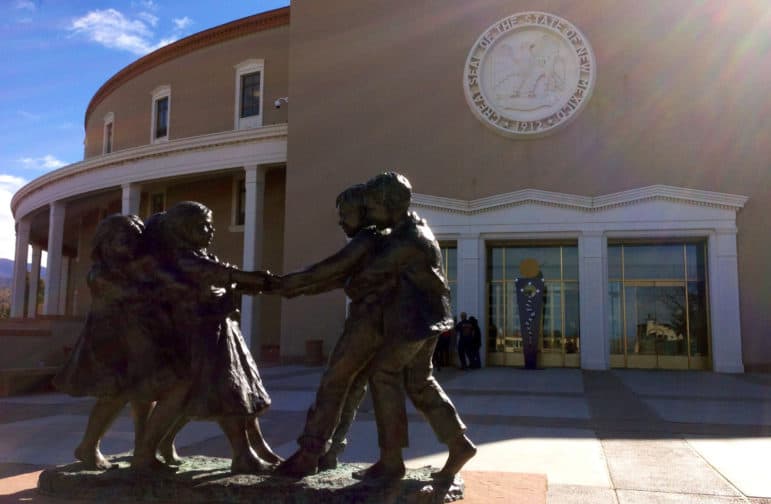
Heath Haussamen / NMPolitics.net
A statue outside the Roundhouse in Santa Fe.
Micaela Baca arrived at the state Capitol early Wednesday with her 10-month-old son, Azariah, and a group of other young people hoping to witness a vote in the House of Representatives that would be the final hurdle for a measure they had been pushing throughout the legislative session.
Senate Bill 231, sponsored by Sen. George Muñoz, D-Gallup, would provide a tax credit of up to $1,000 a year for employers who hire youth in the state’s foster care system and those over 18 who are now living on their own after spending time in state custody.
Baca and others advocating for the measure told lawmakers in committee hearings that the incentive, which mirrors a tax credit for military veterans, would provide an opportunity at independence for many struggling young people with no family support and no job skills.
The legislation passed the Senate on a unanimous vote Tuesday.
Then, just before 10 p.m. Wednesday, the House passed SB 231 on a vote of 60-2 — a huge relief for Baca, who works with the nonprofit New Mexico Child Advocacy Network to improve conditions for foster kids through policy changes.
“I was so tired,” Baca said, “and it was way past Azariah’s bedtime, but I just had to hear for myself that it had passed.”
If Gov. Susana Martinez signs SB 231 into law, advocates say, it will benefit a few dozen young workers in the state in its first year and hopefully will grow as word gets out about the hiring incentive.
Baca, 21, said she knows all too well the barriers that foster kids and former foster youth face when searching for employment. She spent at least six years in foster care, from age 5 to 11, she said, and then she was adopted. But the arrangement didn’t last. Baca ended up back in the foster system until she was 18.
“When I turned 18, I was just kicked out,” she said.
The state provides a stipend to aid former foster youth until they turn 21 and are expected to support themselves on their own income.
But no one wants to hire someone who has been in the foster system, Baca said, explaining that many employers don’t understand the difference between a kid who has been in trouble with the law and “these kids who got taken away from their families for no fault of their own.”
The stigma is difficult to overcome, she said, adding that she has never been hired but is continuing to seek employment. She would like to work in caregiving.
When she heard the measure had passed the Legislature, Baca said, “It felt like I had accomplished something big, and it’s going to help so many people.”
Ezra Spitzer, executive director of the New Mexico Child Advocacy Network, said the bill would provide the tax credit for anyone who hires current or former foster youth age 14 and older who work at least 20 hours a week.
Employers deserve the incentive, Spitzer said, because such young people often need extra guidance and mentorship in the workplace to build strong skills and work ethic.
Arika Sanchez, director of policy and advocacy for Child Advocacy Network, said the bill is part of a blueprint of policy changes that former foster youth have created. They’ve seen some success at the Legislature in recent years — such as passage of a college tuition waiver for foster youth and new policies giving foster parents more leeway to allow kids in their care to have normal childhood experiences, like sleepovers and extracurricular activities.
Sanchez thought the tax credit was a long shot, she said, “But lawmakers were surprisingly receptive across party lines.”
Contact Cynthia Miller at (505) 986-3095 or cmiller@sfnewmexican.com.